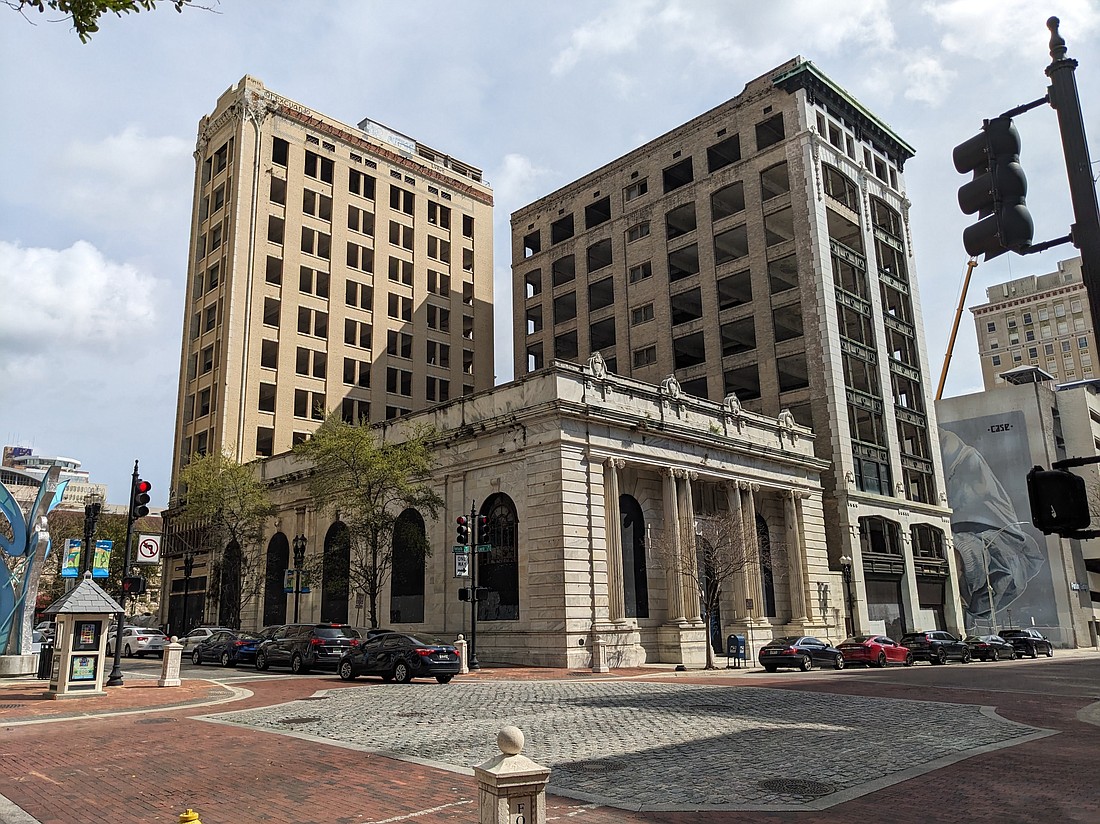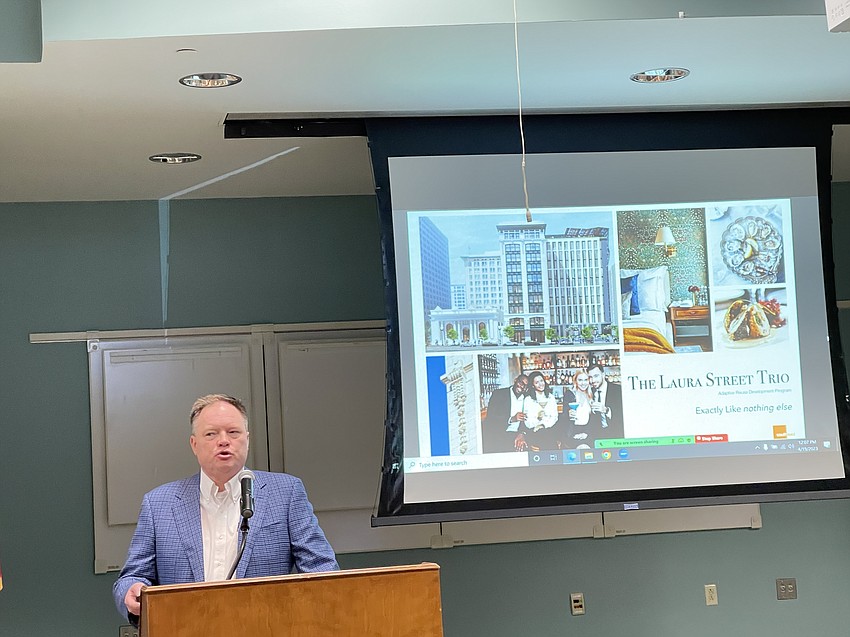
Development of the Laura Street Trio of historic buildings Downtown has hit a dead end, according to a City Council member and documents filed by the Downtown Investment Authority.
In a newly filed resolution, the DIA says the owner and lead developer, Steve Atkins, rejected options presented to him by the city and DIA after the Council opted not to vote on a package of incentives and a $22 million “city participation loan” for the project in January.
Instead, the Council sent that package back to the DIA to revise and renegotiate, citing concerns the package could violate the state constitution and could subject the city to debt upward of $265 million if the developer defaulted.
The resolution states that Atkins returned with a plan that was “only slightly modified” version of the city participation loan, a central cause of concern among Council members about the earlier package. The DIA calls Atkins’ new proposal “untenable” and recommends that no further action be taken on it.
The resolution also would enable DIA CEO Lori Boyer to investigate “all possible opportunities to save and restore” the three buildings.
Eminent domain
Council member Jimmy Peluso, whose district includes Downtown, reacted to the news by saying the city should explore taking the privately owned buildings by eminent domain and seeking another developer for the project. In a post on social platform X, formerly called Twitter, Peluso said, “These buildings are a treasure in Jacksonville, & they’re clearly owned by someone unwilling to do the job correctly.”

“We need to find serious people who want to do serious work,” he said during a phone conversation with the Daily Record.
The incentives package that the Council sent back to the DIA came forth in late 2023 and included $36.5 million in forgivable loans and property tax breaks, a $2 million forgivable loan and the city participation loan, which was designed to guarantee a 25-year construction loan obtained by Atkins from Capital One Public Funding.
The DIA says it presented Atkins with three options in February, two of which he rejected that month. On March 29, the resolution states, he returned to the table with several term sheets, including a financing proposal from Goldman Sachs for the multifamily portion of the project, but also with the slightly modified proposal involving the Capital One funding. The resolution states that the Capital Loan would have been applied to construction of a hotel and that Atkins was unwilling to proceed on the project minus the hotel component.
In a statement, Atkins said he presented multiple term sheets from institutional lenders, including Goldman Sachs, TIAA Nuveen and Capital One Bank to finance “the entire project program.”
Atkins is the principal of SouthEast Development Group LLC of Jacksonville.
“While this information has been presented to DIA CEO Lori Boyer, to-date, we have not been given the opportunity to engage with the (DIA) Board or further discuss and negotiate the available options,” the statement reads. “On April 9th, we received notice that a DIA Resolution has been submitted to terminate the negotiations with the development team to move the project forward, seemingly reflective of most of development projects proposed by private interests for Downtown Jacksonville.”

The proposal that included the city participation loan was the third that Atkins has brought forward to revive the Trio, which comprises the First National Bank Building, Bisbee Building and Florida Life Building. The structures were built from 1902 to 1912 and are among the last remaining unrestored buildings from the years immediately following the 1901 fire that destroyed much of Downtown Jacksonville.
The DIA resolution has been placed on its Strategic Implementation Committee meeting scheduled for 2 p.m. April 12.
Peluso, who serves District 7, said he believed that in rejecting the recent offers, Atkins and SouthEast had shown that they did not intend to act in the city’s best interests. Peluso said that although he would be open to suggestions on options other than eminent domain, he believed the city should cut ties with Atkins and SouthEast.
Keeping the door open, he said, would lead to another five years of decay for the buildings and work for city employees with nothing to show for it in the end.
He sees the city stepping in to stabilize the buildings, which have been vacant for decades, and offering them to other developers.
No demolition
Atkins has raised the possibility that the buildings may need to be demolished.
Peluso said he would oppose any attempt to tear the buildings down.
“We’ve torn down enough buildings in this city,” he said, citing demolitions of properties in LaVilla and Brooklyn that have taken years to redevelop or remain vacant. Peluso said the buildings’ historic value made them worth protecting, and added that there is a sizable inventory of empty Downtown parcels where developers could put up new construction.

In January, city administrators and Council members expressed concerns that the participation loan could violate a state constitutional prohibition on cities lending money for private purposes, expose the city to hundreds of millions of dollars in debt liability and trigger a downgrading of the city’s credit rating, among other potential pitfalls.
The DIA resolution states that the city Office of General Counsel said the proposal offered by Atkins on March 29 did not eliminate concerns over constitutionality.
Documents provided by the DIA included details on the three options presented to Atkins and SouthEast. The three options were aimed at protecting the historic buildings, while Atkins proposed building new construction as part of a $175.1 million project to transform the historic buildings into a hotel, apartments and restaurant. The options:
• The city would purchase the historic buildings, the land under them and the elevator core for market value, then restore the buildings with tax revenue at a cost of $56 million. After completion, Atkins would be given the first right of refusal to purchase and operate the buildings.
• The city would provide a $56 million historic grant disbursed in segments upon completion of stages of construction. Atkins and SouthEast would retain ownership and would be allowed to pay back only half of the grant.
• The city would acquire the land and buildings and lease them back to the developers, or buy and lease the land to them while letting them retain ownership of the building. The city would provide Atkins and Southeast a $26 million-plus historic preservation grant.
Peluso praised the DIA for its work in the negotiations and commended Boyer’s leadership, saying the organization operated diligently and in good faith.
In the SouthEast statement, Atkins says he hopes to keep working with the city on the project.
“As a Jacksonville based developer and long-term investor in downtown, my commitment to this project remains steadfast in fulfilling the promise the Laura Street Trio and its fully programmed execution brings to our community,” the statement reads. “It is our hope that we and the City of Jacksonville can come to an agreement on terms to move this important project forward as soon as possible."